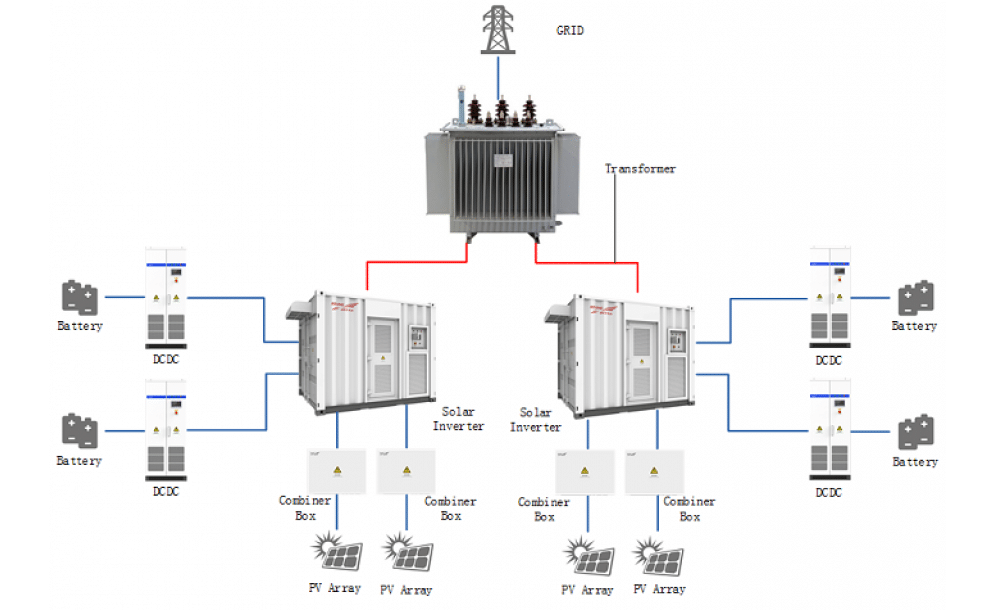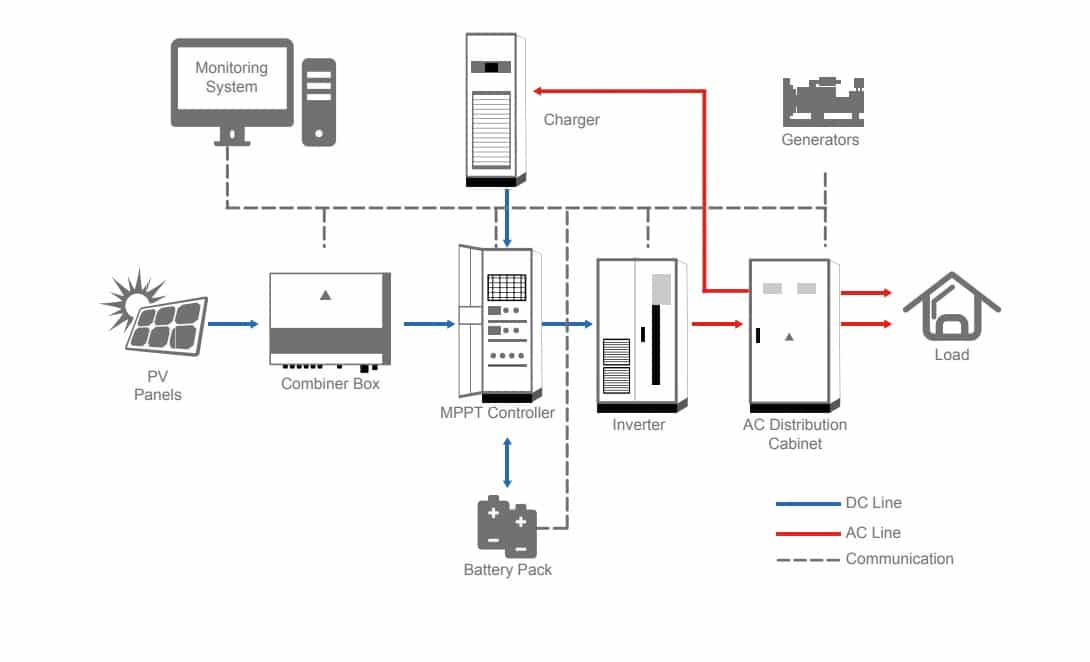DC coupling is revolutionizing the solar energy industry by streamlining energy storage integration and optimizing system efficiency. In this article, we’ll explore the ins and outs of DC coupling, its advantages, and how it’s transforming the solar landscape.
What is DC Coupling and How Does It Work?
In solar energy systems, there are two main methods of connecting solar panels to energy storage: DC coupling and AC coupling. While AC coupling involves converting the solar-generated direct current (DC) to alternating current (AC) and back to DC for storage, DC coupling allows the solar-generated DC power to flow directly into the battery storage system without any conversion. This direct connection simplifies the system architecture and increases overall efficiency.
Advantages of DC Coupling
- Higher efficiency: By reducing power conversion steps, DC coupling minimizes energy loss, resulting in higher overall system efficiency.
- Simplified design: DC coupled systems require fewer components, which simplifies the overall design and reduces the need for maintenance.
- Greater flexibility: DC coupling enables the use of a wider range of solar and battery technologies, such as lithium-ion and LiFePO4 batteries.
- Improved off-grid performance: DC coupling is an ideal choice for off-grid solar systems, as it provides seamless integration of solar and battery storage.
Applications of DC Coupling
DC coupling is suitable for various solar energy applications, including:
- Residential solar: DC coupled systems can help homeowners achieve greater self-consumption of solar energy and lower their energy costs.
- Commercial solar: Businesses can utilize DC coupling to maximize their return on investment by optimizing solar energy utilization and reducing peak demand charges.
- Off-grid and microgrid solutions: DC coupling enables the development of robust, efficient, and reliable off-grid and microgrid solar systems.
- Electric vehicle (EV) charging: DC coupled solar and energy storage systems can be integrated with EV charging infrastructure for clean and cost-effective transportation.
DC Coupling and the Future of Solar Energy
As the renewable energy sector continues to grow, DC coupling is poised to play a significant role in advancing solar and energy storage integration. With its efficiency gains, simpler designs, and flexibility in technology, DC coupling is a game-changer for the solar industry.
By embracing DC coupling and leveraging its benefits, we can unlock the full potential of solar energy and accelerate the transition to a cleaner, more sustainable future.
To learn more about DC coupling and its role in the solar energy landscape, check out these resources:
A Look at DC Coupling in Practice: Tools and Techniques
To better understand the practical applications of DC coupling, let’s dive into some specific tools and techniques used in the industry.
DC Coupling Oscilloscope
The DC coupling oscilloscope is a valuable tool for solar system installers and technicians. It allows them to analyze and troubleshoot solar system performance by measuring the voltage and current waveforms in real-time. With a DC coupling oscilloscope, professionals can quickly identify issues and optimize system performance for maximum efficiency.
DC Motor Coupling
In some solar applications, such as solar tracking systems or solar-powered water pumps, DC motor coupling is utilized to connect solar panels directly to DC motors, which convert solar-generated electrical energy into mechanical energy. By using DC motor coupling, these systems avoid the need for power conversion and achieve greater efficiency.
DC Coupled vs. AC Coupled Solar Systems
While both DC coupled and AC coupled solar systems have their advantages, it’s essential to choose the right one based on your specific needs and requirements. Here are some key factors to consider:
- System efficiency: DC coupled systems generally offer higher efficiency due to fewer power conversion steps.
- Design complexity: DC coupled systems have a simpler design with fewer components, which can result in lower installation and maintenance costs.
- Retrofitting: AC coupling is often more suitable for retrofitting existing solar systems with energy storage.
- Grid interactivity: AC coupled systems may be more suitable for grid-tied applications with specific grid interaction requirements, such as frequency regulation or voltage support.
In conclusion, DC coupling is an innovative technology that’s revolutionizing the solar energy sector by streamlining the integration of solar and energy storage. By understanding its advantages, applications, and tools, we can better harness its potential and accelerate our transition to a cleaner, more sustainable future.
Frequently Asked Questions
Q: What is DC coupling in solar systems?
A: DC coupling is a method of connecting solar panels to energy storage systems by directly connecting the solar-generated DC power to the battery storage without any conversion. This direct connection simplifies the system architecture and increases overall efficiency.
Q: What are the advantages of DC coupling?
A: DC coupling offers several benefits, including higher efficiency, simplified design, greater flexibility in technology choices, and improved off-grid performance.
Q: How does DC coupling compare to AC coupling?
A: DC coupling offers higher efficiency and simpler designs compared to AC coupling. However, AC coupling may be more suitable for retrofitting existing solar systems with energy storage or grid-tied applications with specific grid interaction requirements.
Q: Can I use DC coupling for my residential solar system?
A: Yes, DC coupling is suitable for residential solar systems and can help homeowners achieve greater self-consumption of solar energy and lower their energy costs.
Q: Is DC coupling suitable for commercial solar systems?
A: Yes, businesses can utilize DC coupling in their commercial solar systems to maximize their return on investment by optimizing solar energy utilization and reducing peak demand charges.
Q: Can I use DC coupling for an off-grid solar system?
A: Absolutely! DC coupling is an ideal choice for off-grid solar systems, as it provides seamless integration of solar and battery storage, resulting in a robust, efficient, and reliable energy solution.
Q: What tools are used to troubleshoot DC coupled systems?
A: A DC coupling oscilloscope is a valuable tool for solar system installers and technicians to analyze and troubleshoot solar system performance by measuring voltage and current waveforms in real-time.
Q: Can DC coupling be used with electric vehicle (EV) charging systems?
A: Yes, DC coupled solar and energy storage systems can be integrated with EV charging infrastructure for clean and cost-effective transportation.
Q: What types of batteries are compatible with DC coupled solar systems?
A: DC coupling enables the use of a wide range of solar and battery technologies, such as lithium-ion and LiFePO4 batteries.
Q: Is DC coupling more expensive than AC coupling?
A: The cost of DC coupling can vary depending on the specific system components and design. However, DC coupled systems generally have a simpler design with fewer components, which can result in lower installation and maintenance costs compared to AC coupled systems.
Q: How do I know if DC coupling is the right choice for my solar system?
A: To determine if DC coupling is the right choice for your solar system, consider factors such as system efficiency, design complexity, retrofitting needs, and grid interactivity requirements. Consulting with a solar professional can help you make an informed decision based on your specific needs and goals.
Q: Is DC coupling a viable option for large-scale solar installations?
A: DC coupling can be an excellent option for large-scale solar installations, as it provides higher efficiency and simpler designs, which can result in lower overall costs and better performance.
Q: How does DC coupling affect the lifespan of batteries?
A: By reducing power conversion steps and minimizing energy loss, DC coupling can lead to more efficient energy storage and better battery performance, potentially extending the lifespan of batteries in solar systems.
Q: Do I need a special inverter for a DC coupled solar system?
A: DC coupled solar systems typically use hybrid solar inverters, which are designed to handle both solar and battery connections. These inverters integrate the functions of a solar inverter and a battery inverter into a single device, simplifying the overall system design.
Q: Can I retrofit my existing AC coupled solar system to a DC coupled system?
A: While it’s possible to retrofit an AC coupled system to a DC coupled one, the process may be complex and involve replacing or reconfiguring key components, such as inverters and charge controllers. It’s essential to consult with a solar professional to determine the feasibility and potential benefits of such a retrofit.
Q: How does DC coupling contribute to the growth of renewable energy?
A: DC coupling streamlines the integration of solar and energy storage, helping to unlock the full potential of solar energy. By simplifying system design, increasing efficiency, and enabling greater flexibility in technology choices, DC coupling is accelerating the adoption of renewable energy solutions and driving the transition to a cleaner, more sustainable future.


